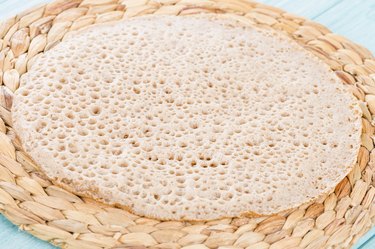
Spongy, flat and dotted with tiny holes, injera is a traditional African flatbread served in both Ethiopia and Eritrea. Injera is served alongside various meat and vegetable stews and is used to scoop up pieces of food with your hands, as well as to soak up the sauces that are a part of every Ethiopian and Eritrean meal. Made with teff flour, a short fermentation period gives the bread its distinctive sour taste.
Read more: Is Ethiopian Food Healthy?
Video of the Day
Video of the Day
Calories, Fat, Carbs and Protein
One serving of injera bread has 379 calories. Because it is cooked in a pan with oil, there are 1.2 grams of fat per serving, although it has minimal saturated fat, with only 0.2 gram per serving. When cooking injera, use a mild-tasting cooking oil like vegetable or grapeseed oil.
A serving of injera also has approximately 80 grams of carbs, almost no sugar and nearly 12 grams of protein.
Dietary Fiber and Sodium
A single serving of injera has 868 milligrams of sodium and 4.2 grams of dietary fiber. According to Colorado State University, most Americans routinely get too much sodium and not enough dietary fiber in their daily diets.
The upper limit of sodium per day is 2,300 milligrams but only 1,500 milligrams for people who are over 51 years old, who have heart disease or who are African-American. Between 21 and 38 grams of dietary fiber is the dietary reference intake per day for adult men and women.
Minerals in Teff
Teff — the tiny, poppy-seed-sized grain used to make injera — is rich in a variety of nutrients, in spite of harsh growing conditions, like flooding, droughts and high altitudes, and is a source of many essential vitamins and minerals.
One-fourth cup of teff supplies 3.68 milligrams of iron, 87 milligrams of calcium, 206 milligrams of potassium, 207 milligrams of phosphorous, 89 milligrams of magnesium and 1.75 milligrams of zinc.
All these essential minerals help your body with various functions, including transporting oxygen throughout your body, in the case of iron; maintaining your heart's electrical activity, in the case of potassium; and making it possible for you to taste and smell, in the case of zinc.
Vitamins in Teff
Teff is rich in a number of essential vitamins, including many from the vitamin B group and vitamins A and K.
A one-quarter-cup serving of teff has almost 0.2 milligram of thiamin, 0.13 milligram of riboflavin, 1.6 milligrams of niacin and 0.2 milligram of vitamin B6. It also has 4 international units of vitamin A and 0.9 microgram of vitamin K.
The B vitamins provide support for your immune system and help you process carbohydrates into glucose, whereas Vitamin K is known as the clotting vitamin, which is essential for blood coagulation. .
Vitamin A is essential for eye health, as well as being a natural antioxidant and protecting your body from damage caused by free radicals, which are created when your body digests food or encounters environmental toxins, such as exhaust fumes. Toxins and free radicals can cause cell damage, increasing your risk of heart disease and cancer.
Read more: Teff Breakfast Bowl
- U.S. Department of Agriculture: Teff, Uncooked
- Exploratorium: Ethiopian Injera
- Colorado State University: Sodium in Diet
- Colorado State University: Dietary Fiber
- Whole Grains Council: Teff and Millet – November Grains of the Month
- MedlinePlus: Iron in Diet
- MedlinePlus: Zinc in Diet
- MedlinePlus: B Vitamins
- University of Maryland Medical Center: Vitamin A (Retinol)
- University of Maryland Medical Center: Vitamin K
- University of Maryland Medical Center: Vitamin A